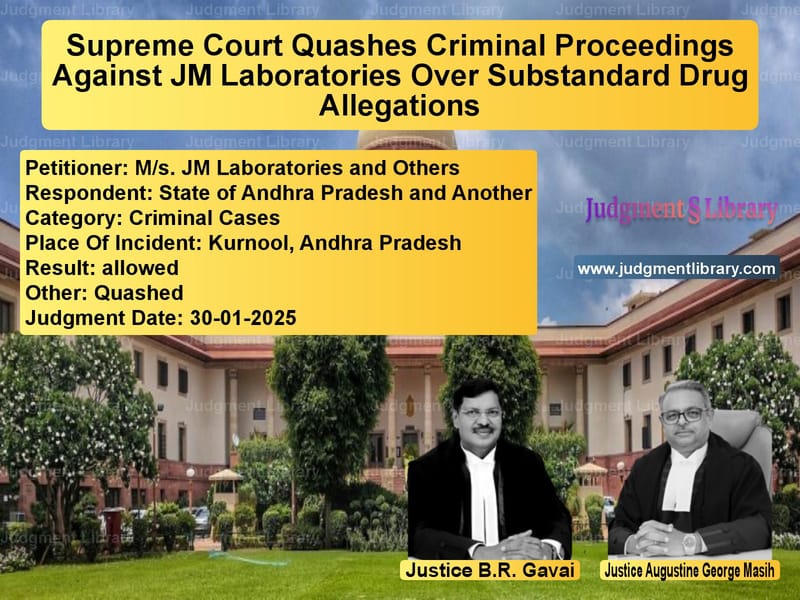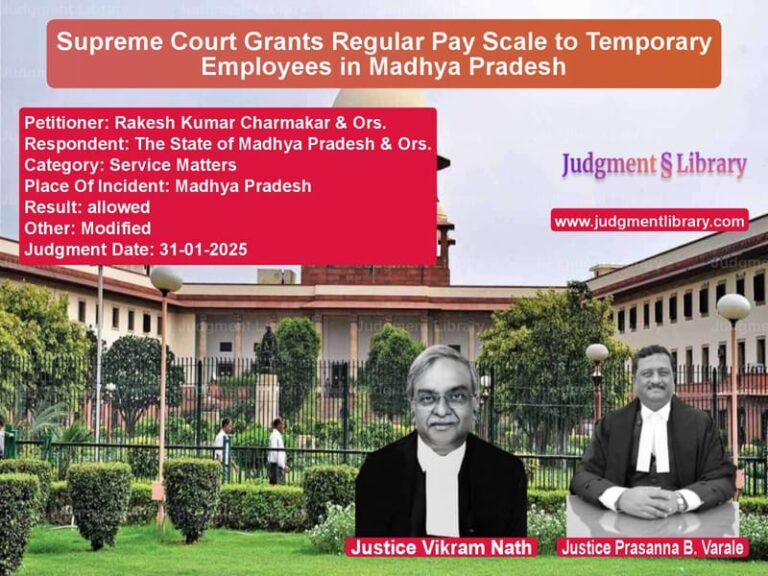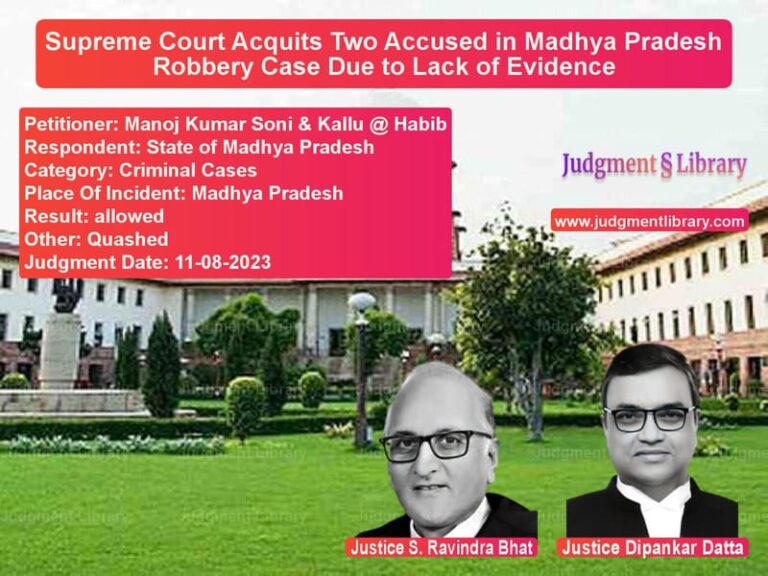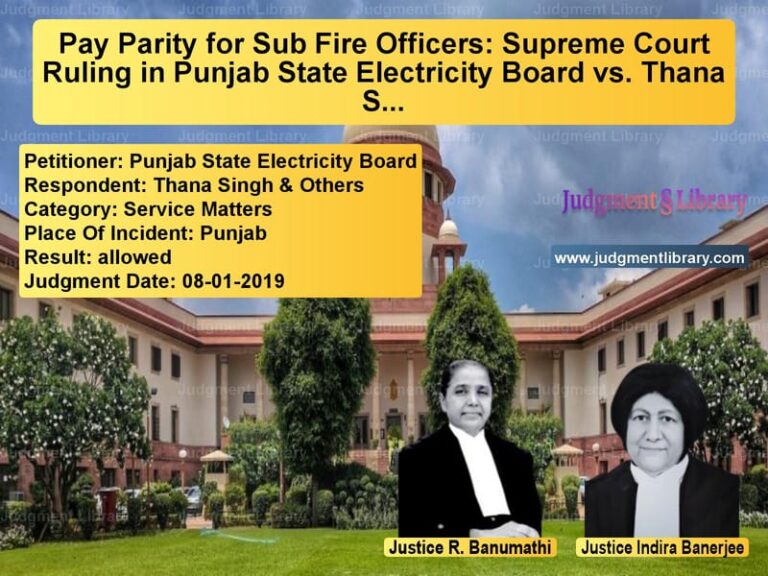Supreme Court Quashes Criminal Proceedings Against JM Laboratories Over Substandard Drug Allegations
The Supreme Court of India has delivered a significant judgment in the case of M/s. JM Laboratories & Others vs. State of Andhra Pradesh & Another, quashing criminal proceedings against JM Laboratories and its partners over allegations of manufacturing and distributing substandard drugs. The ruling emphasized the importance of reasoned judicial orders when summoning accused individuals in criminal cases and addressed critical issues concerning procedural compliance under the Drugs and Cosmetics Act, 1940 and the Code of Criminal Procedure, 1973 (CrPC).
Background of the Case
The dispute began when the Drugs Inspector, Kurnool Urban, filed a complaint under Section 32 of the Drugs and Cosmetics Act, 1940, against JM Laboratories and its managing and silent partners. The complaint alleged that the firm manufactured and distributed a substandard drug, MOXIGOLD-CV 625 (Amoxycillin & Potassium Clavunate Tablets IP), which failed the Dissolution Test for Amoxycillin and Clavulanic Acid.
The series of events that led to the complaint are as follows:
- September 7, 2018: The complainant collected a sample of the drug from the market.
- December 15, 2018: The Government Analyst, Drugs Control Laboratory, Vijayawada, issued an Analytical Report declaring the drug Not of Standard Quality.
- May 2023: The complaint was filed in the Judicial Magistrate of First Class, Kurnool, leading to summons against the accused.
The accused were summoned by the Judicial Magistrate on July 19, 2023, and directed to appear before the court on August 10, 2023.
Legal Issues Raised
The appellants, JM Laboratories and its partners, approached the High Court of Andhra Pradesh under Section 482 of the CrPC to quash the proceedings. However, their plea was dismissed, prompting them to move the Supreme Court.
The appellants raised several key legal issues:
1. Violation of Limitation Period
The appellants argued that the complaint was barred by limitation under Section 468(2) of the CrPC. They contended that the Analytical Report was issued in December 2018, but the complaint was filed more than four years later in May 2023. According to Section 468(2), a complaint must be filed within three years if the offense is punishable by imprisonment not exceeding three years.
2. Failure to Assign Reasons in Summoning Order
The trial court’s summoning order simply stated:
“Whereas your attendance is necessary to give evidence in a charge under Sec. 18(a)(i) r/w Sec. 16(i)(a) of Drugs & Cosmetics Act, 1940 against the accused M/s J.M. Laboratories…”
The appellants argued that the order lacked reasoning and did not demonstrate judicial application of mind.
3. Non-Compliance with Section 202 of the CrPC
The appellants contended that the trial court failed to comply with Section 202 of the CrPC, which mandates an inquiry before summoning individuals residing outside the jurisdiction.
4. Procedural Irregularities in Drug Testing
The appellants argued that the drug testing process had not followed the proper protocol. They pointed out that no retesting had been conducted, which is a mandatory safeguard under the Drugs and Cosmetics Act.
Supreme Court’s Analysis and Judgment
1. Importance of Reasoned Orders
The Supreme Court, referring to the case of Pepsi Foods Ltd. vs. Special Judicial Magistrate (1998), observed:
“Summoning of an accused in a criminal case is a serious matter. The order of the Magistrate summoning the accused must reflect that he has applied his mind to the facts of the case and the law applicable thereto.”
The Court reiterated that judicial orders should not be issued mechanically and that the absence of reasons in the summoning order rendered it invalid.
2. Bar of Limitation
The Court held that the case was indeed time-barred under Section 468(2) of the CrPC. It emphasized that delays in filing complaints undermine the rights of the accused and violate the statutory requirement of timeliness.
3. Failure to Conduct Mandatory Inquiry
The Court noted that the trial court had failed to conduct an inquiry under Section 202 of the CrPC, which was necessary given that the accused were residing outside the court’s jurisdiction.
4. Procedural Lapses in Drug Testing
The Court found merit in the argument that the complainant had not followed the mandatory retesting procedure, further weakening the case against the appellants.
Final Judgment
The Supreme Court ruled:
“In light of the legal principles established in judicial precedents and considering the failure of the magistrate to assign reasons for summoning the accused, we quash the criminal proceedings against the appellants.”
Conclusion
This ruling reinforces the necessity for courts to provide reasoned orders when summoning individuals in criminal cases. It also highlights the importance of adhering to procedural safeguards, such as timely filing of complaints, compliance with statutory requirements, and ensuring due process in drug quality testing. The judgment sets a strong precedent in preventing arbitrary prosecution and protecting the rights of accused individuals.
Petitioner Name: M/s. JM Laboratories and Others.Respondent Name: State of Andhra Pradesh and Another.Judgment By: Justice B.R. Gavai, Justice Augustine George Masih.Place Of Incident: Kurnool, Andhra Pradesh.Judgment Date: 30-01-2025.
Don’t miss out on the full details! Download the complete judgment in PDF format below and gain valuable insights instantly!
Download Judgment: ms.-jm-laboratories-vs-state-of-andhra-prad-supreme-court-of-india-judgment-dated-30-01-2025.pdf
Directly Download Judgment: Directly download this Judgment
See all petitions in Fraud and Forgery
See all petitions in Legal Malpractice
See all petitions in Bail and Anticipatory Bail
See all petitions in Judgment by B R Gavai
See all petitions in Judgment by Augustine George Masih
See all petitions in allowed
See all petitions in Quashed
See all petitions in supreme court of India judgments January 2025
See all petitions in 2025 judgments
See all posts in Criminal Cases Category
See all allowed petitions in Criminal Cases Category
See all Dismissed petitions in Criminal Cases Category
See all partially allowed petitions in Criminal Cases Category







